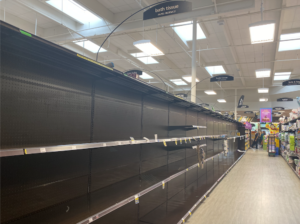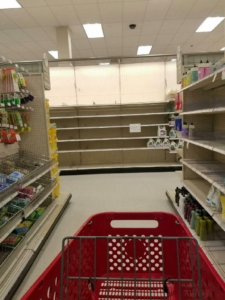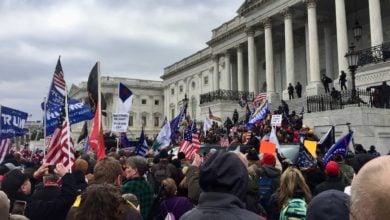
Despite a lock-down and stay-at-home order, many people in San Diego still have to clock in full-time. Around the country, workers deemed to be “essential” during this crisis often receive low pay and inadequate benefits and work under stressful conditions — along with heightened personal health risk.
Many who are working in unsafe conditions are fighting back. InstaCart and Amazon sanitation workers recently walked out and went on strike, for example.
Mainstream media has just glossed over the experiences of grocery workers and sanitation workers during this crisis, despite their importance in everyday life. Liberation News spoke with two workers from San Diego, California, to discuss what it is like to clock in to the front lines of the COVID-19 pandemic.
The capitalist response is insufficient
At the time this article was written, the San Diego County Live Blog updating the local public on the pandemic had registered 1,530 confirmed cases and 38 deaths in San Diego County alone.
Health care workers in local medical facilities report that only “life-threatening cases” are being administered tests for COVID-19. This brings the accuracy of these figures into question.
The calls for a “return to normalcy” by the business community and the capitalist class only exacerbate consequences of local, state and federal governments’ failure in handling this pandemic. They demonstrate a clear willingness to sacrifice workers’ lives for the sake of capitalist production.
Feeding the people: grocery work during a global pandemic
Grocery workers have been deemed “essential” and asked to stay on the job with little to no additional compensation for being put at risk. This is an expression of U.S. capitalism’s inadequacy.
In the People’s Republic of China, the government set up a grocery rationing system. The rationing system prevented hoarding and ensured the safety of consumers and grocery workers alike. Folks were not only able to access basic necessities in stores but to receive such necessities at their doorstep.

Grocery stores in the U.S. are able to remain open because of the workers who run them. Liberation News spoke with Peter, who works at Smart & Final — a grocery store chain.
Liberation News: Hello and thank you Peter. What is your usual workday routine?
Peter: Depending on what is needed, my routine varies from customer service to stocking, sometimes I will have to work at the register.
LN: Do you work full- or part-time?
PS: This is a full-time position.
LN: How long have you been working at this store?
PS: I have worked here for four years.
LN: Do you need to work multiple jobs to make ends meet?
PS: Yes, I am also a DJ.
LN: How have your personal routine and experience changed since the COVID-19 outbreak?
PS: I have become more careful and appreciative of the world around me.
LN: Have you noticed people treating you differently now that we are in a crisis?
PS: Yes, I was recently thanked for just stocking products for the first time in my four years since working here.
LN: How do you feel when you are at work?
PS: I feel more appreciated but more stressed.
LN: How is your family doing?
PS: Well, for being in a crisis.
LN: What is your biggest concern during this outbreak?
PS: That it possibly might not end.
LN: What happens if you get sick?
PS: I will just end up staying home
LN: Do you have health insurance?
PS: Yes.
LN: How could your community better support you?
PS: Be more understanding and appreciative.
Containing the spread: sanitation work during a pandemic
Sanitation workers are underpaid and overworked. Caretakers, food service workers, warehouse workers, janitors, maintenance workers, cleaners, and housekeepers are vital to the health and well-being of our entire society.
These workers are at a higher risk of catching the coronavirus. Despite this, sanitation workers usually make just $11-$17 an hour for their potentially life threatening work.
All sanitation workers — documented or otherwise — are crucial for stopping the spread of COVID-19. Liberation News sat down with Maria, a sanitation worker at Paradise Valley Hospital in National City to elaborate on the current situation faced by Maria and her coworkers.
Liberation News: Hi Maria, thank you for doing this interview. What does a typical work day look like for you?
Maria: We usually clock in, fill up our cleaning carts with what we will need until lunch, and then fill it again until our shift is over. We walk through many areas of the hospital and just sanitize or clean everything we can.
LN: Do you work full- or part-time?
MS: Full-time, 80 hours a week.
LN: How long have you worked at the hospital?
MS: I have been here for almost three years now, but I have been a sanitation worker for almost four decades.
LN: Do you need to work multiple jobs?
MS: No, since I only have one kid, who is a college student who also works, I have been financially stable.
LN: How has the workplace environment at the hospital changed since the outbreak began to spread?
MS: Things have changed greatly at the hospital, my bosses have been checking our temperatures before we clock in to make sure that we don’t have a fever, and if we do, we are sent home. When we go to break, there used to be a shortcut that I would walk through but now we all have to go through the same doors to ensure that our temperature is tested.
LN: Have you noticed people treating you differently now that we are in a crisis?
MS: A doctor thanked me for the first time in years. I cried a little and wanted to give her a hug since people usually dismiss us since we’re just “cleaners.”
LN: What is your biggest concern right now?
MS: My biggest concern is that I might come in contact with it [the coronavirus], and since I’m 64 my body might not react the best to it. I also don’t want to give it to my child since they are expecting to graduate from community college and have a good amount of life to still live.
LN: What will happen to you if you get sick?
MS: I will simply be sent home. I have accrued a lot of sick hours but I will just have to ride that for my income if I were to get sick.
LN: Do you have health insurance?
MS: Yes, through my work.
LN: How could your community and workplace better support you?
MS: Thank sanitation workers more and don’t think that it is easy. We have to learn procedures and take tests to ensure that we know what cleaning product does what.
Workers must come first
The crisis facing the workers of the world is dynamic. It is exacerbated by the anarchy inherent to capitalist imperialism.
Only through international solidarity can we come together as a global community and overcome this collapse. Please consider signing San Diego PSL’s local petition to protect all workers from the dangers and fallout of this crisis.





